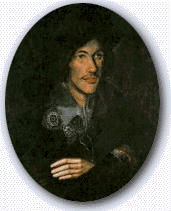English poet John Donne was born sometime between Janurary 24 and June 19 of 1572 in London, England, and died March 31, 1631, in London. Often considered the greatest love poet in the English language, he is renowned as the founder of the Metaphysical poets; who are known for their ability to starle the reader and encourage a new perspective through methods such as subtle argument, inventive syntax, and religious imagery. He is also noted for his religious verses, treatises, and sermons.
Donne was born to Roman Catholic parents, and his mother was a direct descendant of Sir Thomas Moore's sister. Donne's lifetime was during a period of both religious and political turmoil: Catholics were a persecuted minority within England. His education included three years of study at the University at Oxford, and, with some probability, the University of Cambridge. He married Anne More; the daughter of Sir George More, in secrecy. As a result of this, Donne was denied her dowry, was briefly imprisoned, and his chances for a career in public service were effectively shattered.
Finding himself within poverty at the age of thirty, Donne spent the next ten years living off the charity of his wife's cousin. He fathered twelve children; with five of them dying before reaching adulthood. During this time, Donne wrote and studied dutifully; producing works such as prose works on theology and canon law, alongside religious poetry. Starting around 1607, Donne's friends began to urge him to consider Holy Orders. He was ordained a deacon and a priest on January 23, 1615, and he become revered for the power and eloquence of his sermons.
Looking at Donne's work, he essentially had two different periods in which he did his work: his "Carpe Diem" stage, and his more reverent state. The difference between the two was a secular, more worldly Donne, versus a Donne more concerned with Anglican teachings and doctrine. An example of a piece from the "Carpe Diem" era would be "The Flea"; a seduction poem to a lover attempting to downplay virginity and to consummate the relationship between the narrator and his mistress. He uses the symbol of the flea as a metaphor for several concepts; namely the relationship between the lovers, and the virginity of his mistress alongside its insignificance.
John Donne;one of English's most influential poets, went from a worldly life to one concerned with the dealing of faith. His quest to advance himself within the sphere of public service ultimately led him to seek the rites of holy orders and to focus his efforts on religious works.
Sources:
-"John Donne." Encyclopædia Britannica. Encyclopædia Britannica Online Academic Edition. Encyclopædia Britannica Inc., 2012. Web. 16 Mar. 2012. <http://www.britannica.com/EBchecked/topic/169175/John-Donne>.

No comments:
Post a Comment